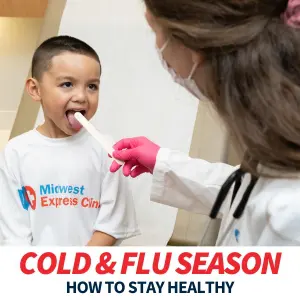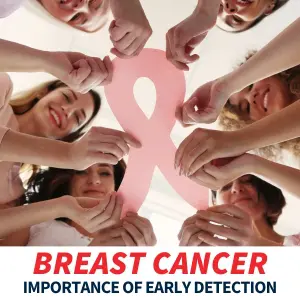November is Lung Cancer Awareness Month, a time to put a spotlight on how lung cancer prevention and early detection can save countless lives. Most lung cancers are caused by tobacco smoking, but other risk factors such as exposure to toxic chemicals, air pollution, and secondhand smoke also contribute to the development of the disease.
Prioritizing annual wellness exams and early detection through imaging tests, such as CT scans, can help identify lung cancer at an early stage, improving outcomes. The number of cigarettes smoked (pack-years) is a key factor in assessing lung cancer risk. Read on to learn more about lung cancer and common risk factors, and find out how prevention strategies such as smoking cessation, avoiding secondhand smoke, and making lifestyle changes can help prevent lung cancer and safeguard your lung health long-term.
What Is Lung Cancer?
Lung cancer, sometimes referred to as lung carcinoma, is a type of cancer that begins in the tissues of the lungs, most often in the cells lining the air passages. This disease develops when genetic mutations cause normal lung cells to grow uncontrollably, forming a malignant tumor. The primary cause of lung cancer is cigarette smoking, but exposure to harmful chemicals, e.g. asbestos, radon, and environmental toxins, can also contribute to the development of cancerous cells in the lungs. According to the National Cancer Institute, lung cancer is the leading cause of cancer death for both men and women, responsible for about 18% of all cancer deaths worldwide. In 2020 alone, there were an estimated 2.2 million new lung cancer cases and 1.8 million lung cancer deaths globally, underscoring the urgent need for prevention and early detection efforts.
Signs And Symptoms Of Lung Cancer
Lung cancer often develops silently, with many people experiencing no symptoms until the disease reaches an advanced stage. When symptoms do appear, they may include a persistent cough, shortness of breath, chest pain, and coughing blood. Other symptoms of lung cancer can include unexplained weight loss, fatigue, frequent respiratory infections, hoarseness, difficulty swallowing, or swelling in the face and arms. Because these symptoms can be mistaken for other health issues, it’s important for individuals at high risk, such as those with a history of smoking or exposure to secondhand smoke, to be vigilant. The World Health Organization recommends that people at high risk of lung cancer undergo regular lung cancer screening with low dose computed tomography (LDCT) scans, which can help detect lung cancer early when treatment is most effective.
The Value Of Early Detection In Lung Cancer Treatment
Detecting lung cancer early, especially before symptoms appear, can dramatically improve survival rates. Early-stage cancer is often more treatable and may involve surgical removal of affected lung tissue. Imaging tests such as CT scans are used to diagnose lung cancer, assess the involvement of nearby lymph nodes, and help determine the extent of disease. Identifying the type of lung cancer diagnosed, such as small cell lung cancer (SCLC) or non-small cell lung cancer (NSCLC), and whether or not lymph nodes are involved, helps guide treatment decisions and prognosis. Early intervention can help shrink tumors and manage symptoms more effectively.
- The U.S. Preventive Services Task Force recommends an annual lung cancer screening with low dose computed tomography for adults ages 50 to 80 who have greater than, or 20 or more pack years of smoking history, who currently smoke or quit within the past 15 years. Chest physicians (pulmonologists) play a key role in interpreting imaging results and determining the type of lung cancer diagnosed.
Screening for lung cancer allows healthcare providers to identify small lung abnormalities that can be more effectively treated due to the disease still being isolated to one area of the body. While Midwest Express Clinic does not offer low dose computed tomography screening services, its preventive health offerings such as biometric screenings and wellness exams provide a foundation for assessing risk and helping patients determine whether additional testing is appropriate.
The Importance Of Smoking Cessation In Lung Cancer Prevention
Quitting smoking is the single most effective step to lower lung cancer risk. According to medical experts, quitting smoking at any age significantly reduces the likelihood of developing lung cancer and other serious chronic illnesses. Quitting smoking and avoiding secondhand smoke are proven ways to prevent lung cancer.
Additionally, smoking cessation not only reduces the chance of developing cancer but also enhances the effectiveness of cancer treatment. Both tobacco smoking and exposure to cigarette smoke increase the risk of developing lung cancer. A person who quits smoking and prioritizes routine health screenings is in a far better position to maintain strong lung health and overall wellness over the course of their life. Individuals are encouraged to quit smoking to lower their increased risk of lung cancer. Reducing exposure to cigarette smoke and tobacco smoking can help prevent lung cancer.
Support For Lung Cancer Patients And Their Families
A lung cancer diagnosis can be overwhelming, but patients and their families do not have to face it alone. Organizations such as the American Cancer Society, the National Cancer Institute, and the American Lung Association offer a wide range of support services, including counseling, support groups, educational resources, and financial assistance. The National Cancer Institute’s Cancer Information Service (CIS) provides up-to-date information on lung cancer treatment options, clinical trials, and strategies for coping with cancer. The American Lung Association also offers a dedicated lung cancer support hotline and an online community where patients and caregivers can connect with others who understand their journey. These resources are designed to provide comfort, guidance, and hope to everyone affected by lung cancer.
How Midwest Express Clinic Promotes Preventive Health
Midwest Express Clinic offers walk-in services seven days a week. Each location provides a wide range of services that support healthy living. Key wellness and preventive services available include:
- General wellness exams: Experienced urgent care providers review medical history and lifestyle habits, including tobacco use, and perform full-body assessments. These visits allow urgent care providers to order labs or diagnostic tests when needed, which may include referrals for lung cancer screening.
- Biometric screenings: These screenings measure blood pressure, body mass index, heart rate, blood glucose, and cotinine levels. Cotinine levels can detect recent tobacco use and secondhand smoke exposure. Identifying these disease markers early helps patients take proactive steps toward treatment and maintaining optimal health over time.
- Chronic and preventive care: Midwest Express Clinic supports ongoing management of chronic conditions and respiratory issues through routine health evaluations, diagnostic testing, and lifestyle adjustments. Early detection and management of lung cancers can help preserve healthy lung tissue.
Take Action During Lung Cancer Awareness Month
Midwest Express Clinic encourages everyone to take the following proactive steps toward better lung health.
- Review your personal and family health history: Consider factors such as your smoking history, including the number of cigarettes smoked (pack-years), environmental and occupational exposures, and family history of lung disease.
- Discuss early detection with your provider: If you meet lung cancer screening criteria or have concerns about your risk factors, visit your provider for a consultation to discuss these concerns. Imaging tests such as CT scans may be recommended by chest physicians (pulmonologists) to help diagnose lung cancer early and assess the extent of disease.
- Commit to quitting smoking: Midwest Express Clinic urgent care providers can help you explore programs, resources and medications that support smoking cessation for good. Adopting a healthy diet rich in fruits and vegetables is also encouraged as part of a comprehensive approach to prevent lung cancer.
By understanding lung cancer risk factors, pursuing lung cancer early detection, and quitting smoking, patients can take meaningful steps toward a healthier future. Quitting smoking, maintaining a healthy diet, and regular screening are key steps to prevent lung cancer and improve outcomes if lung cancer is diagnosed. Midwest Express Clinic providers and medical staff are ready to support every patient’s journey with compassionate, accessible care rooted in prevention and wellness.
To find fast care in your neighborhood, visit midwestexpressclinic.com/locations.




